
For Women’s Golf Day 2021, coming up June 1, GCM has partnered with John Deere Golf to spotlight women working and thriving in golf course management. Here, in their own words, five women share their career journeys, discuss challenges and lessons learned, offer advice to fellow women in turf, and suggest ways the industry as a whole can foster more inclusive work environments.
Lucy Castaneda
Golf course superintendent
University of New Mexico North Course
Albuquerque, N.M.
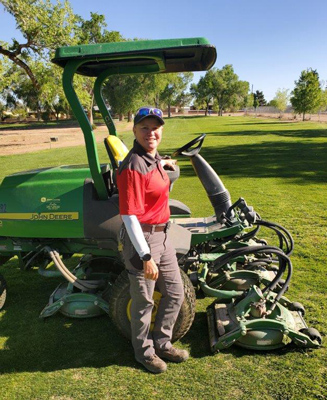
I started playing golf when I was 11, and in 1981, I was looking for a summer job. My dad said, “Why don’t you go work at the pro shop at UNM?” The pro shop didn’t have any openings, but the pro did mention that the maintenance department might be hiring. Sure enough, they were, and Al Kline, superintendent at the time, hired me as a part-time greenkeeper. From there, I got on full time as a greenkeeper, then a lead, then an irrigation tech, and then as an assistant supervisor.
In 2006, I was promoted to an assistant superintendent. Once, while in that position, I disciplined one of our workers with a verbal warning, then a written warning. We had a meeting with the then-superintendent, and at the end of the meeting, the superintendent tore up the written warning and no action was taken. I felt like I had no authority. I was in charge of about 10 guys at the time, and for a while after that, I didn’t have a leg to stand on, because they all knew what had happened. They tried to get me fired, but I thankfully had a director of golf who saw things differently.
In 2007, the university decided to privatize the golf course maintenance department and brought in Mountain West GolfScapes to take over, which is who I work for now. In 2009, my current boss, John Mondragon, offered me the superintendent position at the UNM North Course. What I learned from the employee-disciplining incident is that you have to stand your ground when you know you’re right, and doing so can lead to positive outcomes.
Being a manager isn’t easy. You have different personalities, moods, behaviors, personal lives and attitudes to deal with. In watching my past bosses — I’ve had seven — I picked up a little something from each of them about managing a crew, such as how to communicate; praise good work; give positive, constructive criticism; be a good listener; be a good delegator; and lead by example.
Most of my bosses were great delegators and were not afraid to share what they knew. I think that’s the way it should be with anyone who is in charge, man or woman. The more your employees know, the better it is for all of you. Don’t fear that someone is trying to take your job; fear that you may fail at yours because your team isn’t all on the same page.
I’ve learned so much on the job, but I’ve also attended conferences, online training, GCSAA training, Rio Grande GCSA seminars, free webinars, superintendent meetings and networking events. And sometimes I’ll just call another superintendent for advice. There’s always someone who knows more than you do, so take advantage of their knowledge and always continue to learn.
I’m where I’m at today because of devotion, dedication, responsibility and hard work. It wasn’t easy, especially with all life can throw at you. I was diagnosed with breast cancer in 2016. I started chemotherapy in January 2017, and I decided to take the longer route for the treatments so I could continue to work, which really helped me not to dwell too much on what I was going through. Sometimes I could only work six hours a day, and my boss and my employees were very supportive. My wife was my main support system. She went to every treatment, surgery and appointment with me. She is a true blessing. My last chemo treatment was in March 2018, and I am proud to say that I am now cancer-free.
I’m still enjoying my journey in the golf industry, and I wouldn’t change a thing about it, even going through cancer. The experience changed my whole outlook on life. I began to live more, appreciate family more, treasure my friends, and never take a moment for granted. I also learned to be good to people, because you never know what they’re going through.
If there is any advice other women in turf can take from my story, I’d say that it’s to love what you do, and to live life to the fullest.
Editor’s note: Hear from Castaneda about how water that’s used to cool buildings on the University of New Mexico campus gets a second life as irrigation for the North Course in Doubling use in the desert.
Morgan Creighton
Assistant superintendent
Woodside Golf Course
Airdrie, Alberta
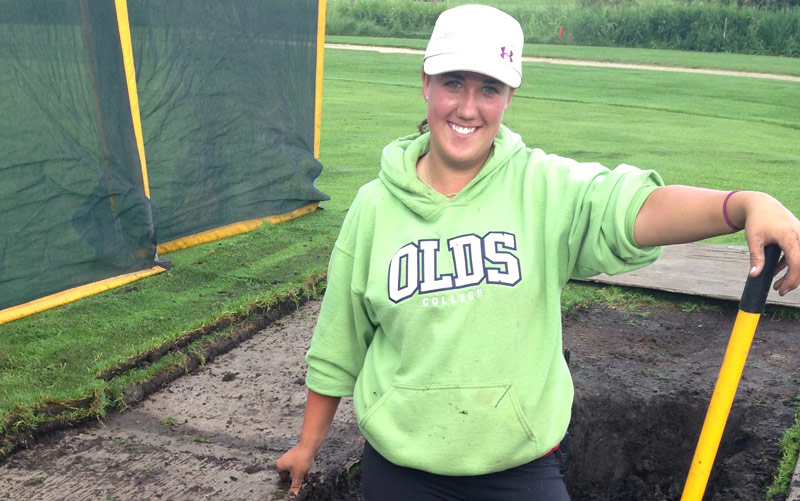
I got my start in the golf industry working at Edmonton (Alberta) Country Club as a full-time staff member. I was taking night classes at the time, pursuing a degree in education. When I realized that career path wasn’t for me, I felt lost. My goal had always been to teach high school science. I continued working at the golf course, and one day, the assistant superintendent at the time suggested I look into the golf course management program at Olds College in Alberta. I had never considered it until that moment. I’d always had a passion for the outdoors and had loved the four years I’d spent working at Edmonton CC, so I decided to enroll.
After graduating, I applied for a job that seemed like the perfect fit. The job description was vague, but it did mention diversity and inclusion. I was hired, and on my first day, I walked into a room of 14 men all above the age of 45. I was instantly an outcast. I was on my own. The job ended up being very toxic, and I spiraled into a deep depression. I left after exactly two years, and I’ll forever be thankful for the people who helped pull me out. I started seeing a counselor for my mental health and to learn how to cope with difficult situations.
From that bad job experience, I learned to be more direct in job interviews and to read between the lines. Listen to yourself — your gut, your head. Listen to those around you when they reach out. If you are unhappy in your current job, know that you are not stuck. There will always be another opportunity.
As women in turf, I believe we must be confident in our ability to be strong, fair leaders. If you do not at least project an image of confidence, those who work for you may lose respect for you. (If you’re nervous about speaking in front of the staff, practice! The only way to get better is to do it more often.)
Much of my approach to being a manager is based on what I’ve gleaned from the previous places I’ve worked and managers I’ve had. Reflect on your own experiences and take time, ahead of time, to create a mental list of what to do and what not to do in certain situations, and stick to that.
Also, invest time in getting to know each person on your team. What are their interests? What tasks do they like or dislike? What do they want to learn? Employees tend to care more about a job and take pride in their work when they have a manager who engages with them beyond just giving them instructions. I found my way into this profession thanks to a manager who got to know me and saw my potential — a testament to the influence that managers who engage can have on advancing awareness of this profession.
Keep in mind, too, that you are a professional and someone all staff members need to feel comfortable talking to. Be impeccable with your word. I am a firm believer in the guideline that if you cannot continue a conversation you’re having because someone else walks into the room, it’s not a conversation you should be having at your place of employment. As managers, it is incumbent upon us to ensure staff members are happy, healthy and safe, and a guaranteed way for them not to feel that way is if they overhear you making an inappropriate comment or joke.
My best advice to fellow women in golf course management is to be true to yourself, work hard and be honest. If you can do those things, you will succeed in this industry. It won’t always be easy, but nothing worth it ever is.
Kathy Hauff
Golf course superintendent
Eastmoreland Golf Course and RedTail Golf Course
Portland, Ore.
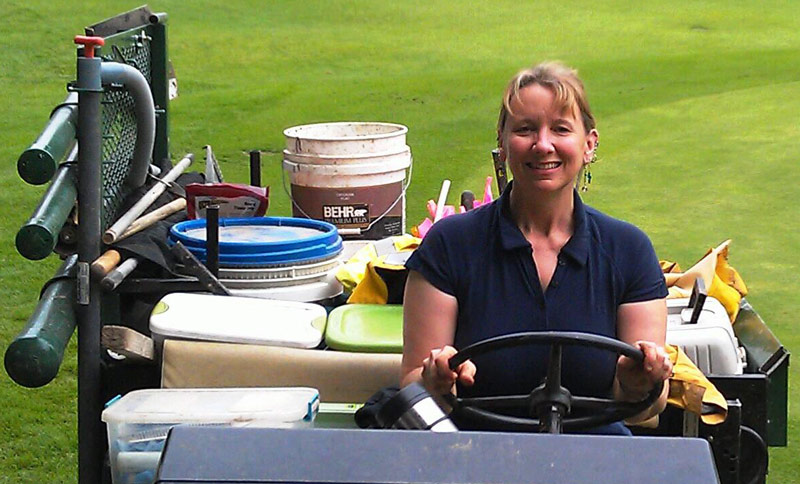
I started in golf course maintenance the summer after graduating from high school in 1978. It was my summer job for about 12 years, but I never thought of it as a career until my husband and I moved to Portland, Ore., and I got a position as a greenkeeper at the city’s Heron Lakes Golf Course in 1991. I realized then that this was what I truly enjoyed doing and could see myself doing for the rest of my working life.
When I applied for the job with the city of Portland, being a woman was actually an advantage, as women were underrepresented in this type of work, and the city was looking to be more inclusive. I’ve never felt that I was treated differently or was at a disadvantage being a woman in this profession — it never even occurred to me that I might be, because I work hard and do my best.
For women who are in leadership roles in this industry, I think the most important thing you can do is take lessons from the people in your career who have been good leaders as well as those who have been bad leaders. Let those lessons — those do’s and don’ts — guide your approach. Learn from your employees, too — what works with one group may not work with another. I now manage two golf courses, and the staff dynamics at each course are quite different. Be open to different approaches to problem-solving. There are many ways to reach a goal, so don’t assume your way is the only way. Take advantage of any classes, programs or resources offered to you on the job that are aimed at helping you hone your skills as a supervisor.
For women aspiring to make golf course management their career, my best advice is to get a degree in turf management. For those just diving into their first job on a golf course, be on time, pay attention, ask questions, show interest and be a self-starter. Cultivate patience, because moving up always takes time.
For any superintendent looking to help champion women in the industry, I think the most important thing is simply to be open to anyone who might walk through the door wanting a job. At the courses I manage, we are always looking for seasonal employees, and these positions are a great way for anyone to get an idea of what’s involved in this line of work without a long-term commitment. A lot of people don’t know about golf course work and that it can become a profession. It has been mine for 43 years.
Editor’s note: Learn more about women blazing trails in the turf industry and read more of their stories and insights in GCMOnline.com’s women in turf collection.
Lianne Larson
Director of operations
White Cliffs Country Club
Plymouth, Mass.
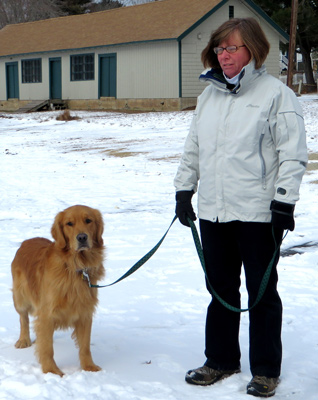
I grew up next door to a country club and always enjoyed playing golf and caddying, but I never really thought about what went into the maintenance of a golf course. I went to college for business finance and got a corporate job. One day, I decided that world was no longer for me, and I went down the road to the golf club that was hiring. Thirty-five years later, I have never looked back.
I learned the golf course superintendent profession through the school of hard knocks and by seeking out as much education as possible through GCSAA. The men I have encountered along the way have been terrific friends and mentors, and if it weren’t for great mentors, I don’t think I would have had such a long and satisfying career, which has included 12 years serving my local GCSAA chapter, the Cape Cod GCSA, culminating in being chapter president. (When I first became a member of the chapter, jackets and ties were required for meetings. One of the old-timers would bring me a tie, saying he thought I might not have one, so he had me covered!)
My advice for women in this industry is, first and foremost, to be yourself. Learn how to listen. Work hard. Learn as much as possible. I would advise finding a mentor who can help you succeed. From those who mentored me, I learned a lot about how to motivate people and about respecting opinions. Getting involved with your local GCSAA chapter and engaging with the industry as a whole are invaluable to growing within your career and perhaps connecting with that essential mentor.
To be a good manager, treat people how you would like to be treated. I think more women don’t get into this field because it’s often very difficult to find that work-life balance. I manage each person differently, and I tell my team that their priorities should be their health first, family life second, and job third, as I believe that if a person is healthy and their personal life is healthy, they will come to work each day and give their best.
Ariana Pesce
Territory manager
Finch Services Inc.
Long Island, N.Y.
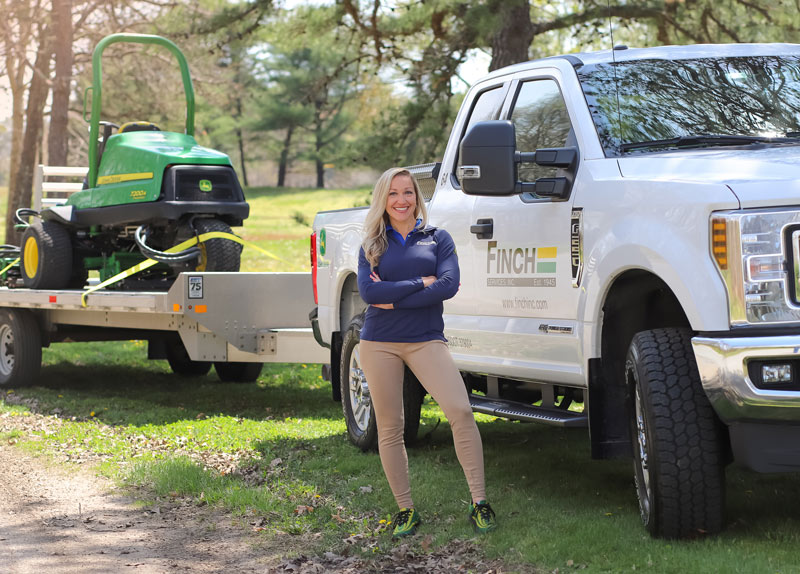
Working for Finch and John Deere is a surprisingly different career path than I had imagined. Originally, I studied opera and worked in sales and marketing for a software company. After deciding that I wanted a more flexible work schedule, I answered a job ad for a sales and marketing administrator for a John Deere dealership on Long Island. That was 11 years ago. Now, with turf being “part II” of my career, I couldn’t be more excited and passionate about what I do for a living.
Working in a predominantly male industry brings many challenges. The largest one is fighting assumptions and gender stereotypes. There have been many times when associates have questioned how I am able to make a sale, doubted my knowledge of machine specs, or assumed I can’t load my own equipment on a trailer. As a woman, especially a saleswoman in this industry, it’s important to “stay ahead” of these assumptions so others don’t have a chance — or a reason, for that matter — to make them again. Not only am I capable of doing my job, I believe I’m very good at it. Hopefully one day, more women being in this industry will be more of the norm, and I won’t feel as though I have to prove myself to others.
In order to succeed in this industry, I think it’s important that you listen to your peers and learn from those who are more experienced. To be honest, I have never met a more helpful group of people. Because we are such a niche industry, everyone is willing to provide guidance and support, and that has definitely allowed me to grow professionally.
In addition, being a woman in a male-dominated field has its advantages. Women in general are often very detail-oriented, organized and great communicators. By playing to my strengths, I have used these attributes to earn a strong foothold in my position as a female salesperson.
One of the most important ways to ensure gender equality is to believe that you are equal and portray yourself as an equal. Some men in the industry already do the things necessary to make women feel comfortable on the job and go above and beyond to have us as equal players, even when others may not agree. At Finch, my entire sales and service teams are men. We carry ourselves like a family, which allows us to speak openly without judgment. I know they have my back, and they know I have theirs. We can be candid and joke without getting offended, which can be difficult in this day and age. As a woman, you know what the line is, and you just need to make sure it’s clear.
For men who may need guidance working with women, I would say just to treat them the same. When offering guidance or information, mentor them as you would your male co-workers. Make it clear to women that if they feel disrespected or discriminated against, you are a person they can come to as an advocate. Most importantly, always defend your teammates — we are all in this together.
This is a difficult industry to be in for both men and women. But you can have it all — family, career, relationships — if you work hard and don’t make excuses. Be creative, and don’t think you can’t be aggressive in this field and get ahead. I would even take it a step further and say you must be aggressive, and, again, always carry yourself as an equal. I hope that in the future, we start hearing more from women in turf about their career accomplishments, not just their struggles.